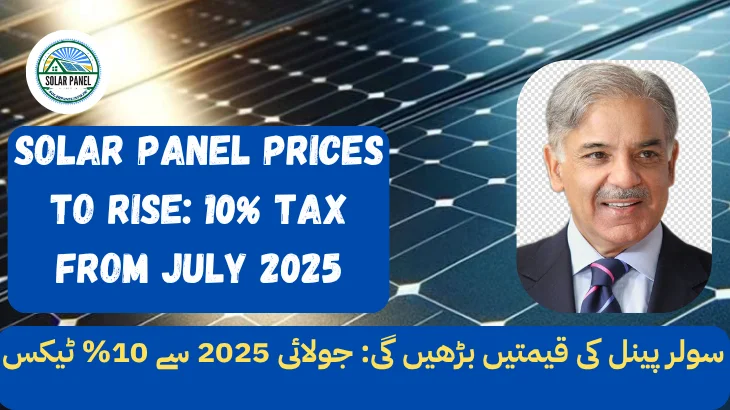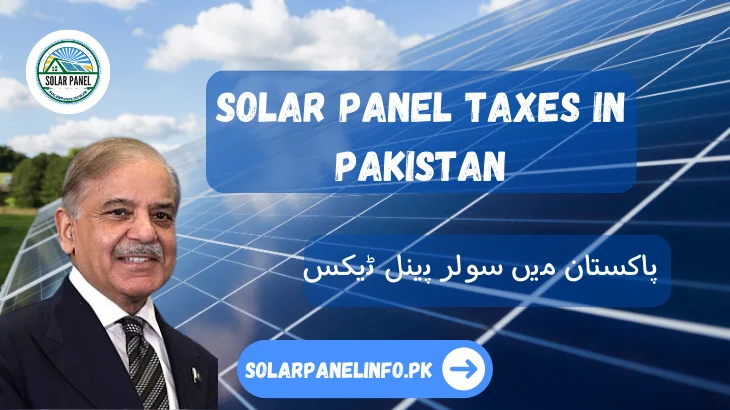Solar Panel Prices to Rise: 10% Tax from 2026
Pakistan will implement a 10% general sales tax (GST) on imported solar panels on 2026. This plan is included in the 2025-2026 period, and it calls for a change from the earlier proposed 18% tax. Concerns about how the New Levy might affect solar cost, uptake, and national climate targets have been voiced by industry participants and scholars. The government intends to augment domestic solar panel manufacture through the levy. Here is a detailed investigation into the ripples, significance, and critical issues concerned. In this article, we will discuss the Solar Panel Prices to Rise: 10% Tax from July 2026.
Read more: Solar Panel Rates in Pakistan Post 10% Tax 2025

پاکستان یکم جولائی 2026 سے درآمدی سولر پینلز پر 10% جنرل سیلز ٹیکس (GST) نافذ کرے گا۔ یہ منصوبہ 2025-2026 کی مدت میں شامل ہے، اور اس میں پہلے تجویز کردہ 18% ٹیکس سے تبدیلی کا مطالبہ کیا گیا ہے۔ نئی لیوی شمسی لاگت، اپٹیک، اور قومی آب و ہوا کے اہداف کو کس طرح متاثر کر سکتی ہے اس بارے میں خدشات کا اظہار صنعت کے شرکاء اور اسکالرز نے کیا ہے۔ حکومت لیوی کے ذریعے گھریلو سولر پینل کی تیاری کو بڑھانے کا ارادہ رکھتی ہے۔ یہاں اس سے متعلق لہروں، اہمیت اور اہم مسائل کی تفصیلی تحقیق ہے۔
The government imposed a tax on solar panels
An 18% GST was proposed in the federal budget for the FY 2025–2026 on imported solar panels and related equipment in a bid to protect local manufacturers. Analysts like the Pakistan Solar Association (PSA) warned, however, that it would end up sabotaging the renewable energy goals of Pakistan and, in due course, hinder the development of rooftop solar.
As a result of the resounding opposition, coupled with legal opposition from the National Assembly’s Finance Committee, decreeing the scheme ineffective, the government reduced the rate to 10%. The aforementioned will take effect from 2026, although announced in 2026.
What Effect Will the Tax Have on Pakistan Solar Panel Prices?
As a result of implementing 10% GST, there is a huge problem with the cost of the Solar system, especially for small and domestic businessmen. There is a basic problem here:
| Solar System Size | Previous Price (PKR) | Estimated Price After Tax (PKR) |
| 3kW | 500,000 | 550,000+ |
| 5kW | 850,000 | 950,000+ |
| 10kW | 1,600,000 | 1,750,000+ |
Read more: 10kW Solar System Price in Pakistan
The actual increase will vary based on:
- Brand and origin of panels (Chinese, European, etc.)
- Import duty and shipping costs
- Installation fees and inverter/battery pricing
Many suppliers warn that consumers should expect a 12% to 18% increase in total system costs due to cascading taxes and supply chain impacts.
Who Is Most Affected by the 10% Solar Panel Tax?
Middle-Class Homeowners: Families that decide to convert to solar power to save a significant amount of money on electricity bills will be the most financially impacted.
Small Businesses: Manufacturers, retailers, and farmers who rely on inexpensive solar systems may decide to delay or scale back their plans.
Off-Grid Rural Areas: Houses in rural areas without connection to the grid can utilize small solar kits. Additionally, their cost will increase to the point that underserved areas will potentially experience energy poverty.
What Relief or Alternatives Are Under Consideration?
Policymakers are taking into account targeted subsidies or partial relief measures as criticism mounts, including:
- Solar loans with no interest offered by national banks
- Small-scale solar project subsidies in rural and agricultural areas
- Exemptions for hospitals or educational institutions
Till June 2025, however, no reliable method has been established. To give time to the businessmen and the people to do their bit, the stakeholders are trying to get a clear line of credit for tax from the government.
The Reasons Behind the Tax Proposal
Protecting Local Manufacturing
Financial authorities contended that the levy would enable domestic PV producers to compete with low-cost imports, so safeguard local manufacturing.
Creating Revenue
Through these and related measures, the government anticipated collecting about Rs 20 billion.
Alignment of the IMF Budget
The IMF guidelines for revenue expansion and more extensive structural change.
Direct Impact on the Cost of Solar Panels
Price Increase
A-grade solar panels cost between Rs. 28 and Rs. 38 per watt before the tax change. Customers should anticipate a 10% rise in panel prices due to a 10% import GST. The price of a mid-range 600 W module, which is now Rs 30/W (Rs 18,000), might increase to Rs 33/W, or Rs 19,800, adding Rs 1,800 to the basic expenses.
Ripple Effects
In preparation for the 10% import tax, panel providers have already started to modify their pricing. Because of increased import tariffs, logistics, and local suppliers’ margins, this rise will impact the expenses of the entire system.
Perspective and Upcoming Issues
July 1st marks the start of the new fiscal year:
Panel costs stabilize to level off at ten percent higher than they are now.
Local vendors could become more popular for delivery and assembly.
In order to make adjustments in future budgets, policymakers may keep an eye on market response.
Current measurements do not include:
Support for grid integration techniques and panel-based net-metering.
Tax holidays or subsidies for machinery and raw materials, akin to the budget exemptions for 2023–2024
Conclusion
The announcement of a 10 percent tax on solar panels from July 1, 2025, is optimistic but will probably stymie the green energy transition in Pakistan. The government has its reasons for the tax: raising revenue and tax reform-but a majority of Pakistanis believe the social and environmental costs are bound to outweigh the monetary benefits. In order for Pakistan to attain energy independence, resilience to climate change, and economic stability, solar must, therefore, be affordably priced. Balanced governance will need to foster innovation and adoption.
1 جولائی 2025 سے سولر پینلز پر 10 فیصد ٹیکس کا اعلان امید افزا ہے لیکن ممکنہ طور پر پاکستان میں سبز توانائی کی منتقلی کو روک دے گا۔ حکومت کے پاس ٹیکس کی وجوہات ہیں: محصولات میں اضافہ اور ٹیکس میں اصلاحات- لیکن پاکستانیوں کی اکثریت کا خیال ہے کہ سماجی اور ماحولیاتی اخراجات مالیاتی فوائد سے کہیں زیادہ ہیں۔ پاکستان کے لیے توانائی کی آزادی، موسمیاتی تبدیلیوں کے لیے لچک اور معاشی استحکام حاصل کرنے کے لیے، اس لیے، شمسی توانائی کو مناسب قیمت پر ہونا چاہیے۔ متوازن طرز حکمرانی کو جدت اور اپنانے کو فروغ دینے کی ضرورت ہوگی۔
FAQ’s
When will the 10% tax on solar panels start in Pakistan?
The 10% tax on imported solar panels will take effect from July 1, 2025.
How much will solar panel system prices increase after the tax?
Overall, prices are projected to increase by 12% to 18%, depending on the system size and brand.
Why is the government imposing this tax on solar panels?
The tax is designed to encourage local manufacturing and boost government revenue as part of financial reforms.


